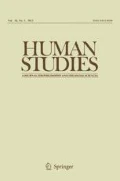Abstract
This article examines the learning of a scientific procedure, and its connection to the greater scientific community through the notion of Wittgensteinian rules. The analysis reveals this connection by demonstrating that learning in interaction is largely grounded in rule-based community descriptions and judgments rather than any inner process. This same analysis also demonstrates that learning processes are particularly suited for such an analysis because rules and concomitant phenomena comprise a significant portion of any learning interaction. This analysis further reveals the elucidating merit of Wittgensteinian rules, their relation to community and the concept of practice, and promotes the efficacy of participant-generated rule-formulations as analytic descriptors.
Similar content being viewed by others
References
Bailyn, S. J. (2002). Who makes the rules? Using wittgenstein in social theory. Journal for the Theory of Social Behaviour, 32(3), 311–329.
Baker, G. (1981). Following wittgenstein: Some signposts for philosophical investigations. In C. Leich & S. Holtzman (Eds.), Wittgenstein: To follow a rule (pp. 143–242). London: Routledge & Kegan Paul.
Blair, D. (2006). Wittgenstein, language and information: ‘Back to the rough ground’. Berlin: Springer.
Bourdieu, P. (1984). Homo academicus. Stanford: Stanford University Press.
Cavell, S. (1998). Must we mean what we say. Cambridge: Oxford University Press.
Coulter, J. (1973). Language and the conceptualization of meaning. Sociology, 7, 173–189.
Coulter, J. (1989). Mind in action. New Jersey: Humanities Press International.
Erickson, F. (2004). Talk and social theory: Ecologies of speaking and listening in everyday life. Malden: Polity Press.
Erickson, F., & Shultz, J. (1982). The counselor as gatekeeper: Social interaction in interviews. New York: Academic Press.
Giddens, A. (1984). The constitution of society: Outline of the theory or structuration. Berkeley: University of California Press.
Giddens, A. (1989). A reply to my critics. In D. Held & J. B. Thompson (Eds.), Social theory or modern societies: Anthony Giddens and his critics. Cambridge: Cambridge University Press.
Grayling, A. C. (1996). Wittgenstein. Oxford.
Hacker, P. M. S. (2000). Wittgenstein mind and will: Part I essays. Oxford: Blackwell.
Hark, M. T. (1990). Beyond the inner and the outer: Wittgenstein’s philosophy of psychology. Dordrecht: Kluwer Academic Publishers.
Huemer, W. (2006). The transition from causes to norms: Wittgenstein on training. Grazer Philosophische Studien, 71, 205–225.
Lähteenmäki, M. (2003). On rules and rule-following: Obeying rules blindly. Language & Communication, 23, 45–61.
Malcolm, N. (1989). Wittgenstein on language and rules. Philosophy, 64, 5–28.
McDowell, J. (1984). Wittgenstein on following a rule. Synthese, 54, 325–363.
Morawetz, T. (1980). Wittgenstein and knowledge: The importance of on certainty. Sussex and Atlantic Highlands: Harvester Press.
Pratt, V. (1989). The philosophy of the social sciences. London: Routledge.
Sharrock, W., & Button, G. (1999). Do the right thing! rule finitism, rule scepticism and rule following. Human Studies, 22, 193–210.
Suchman, L. A. (1994). Plans and situated actions: The problem of human machine communication. New York: Cambridge University Press.
Taylor, C. (1997). Philosophical arguments. Cambridge: Harvard University Press.
Vendler, Z. (1967). Linguistics in philosophy. Ithaca: Cornell University Press.
Williams, M. (1991). Blind obedience: Rules, community, and the individual. In K. Puhl (Ed.), Meaning skepticism (pp. 93–125). Berlin: deGruyter.
Winch, P. (1956). Social science. British Journal of Sociology, 7, 18–33.
Winch, P. (1958). The idea of a social science and its relation to philosophy. London: Routledge & Kegan Paul.
Wittgenstein, L. (1953). Philosophical Investigations. (trans: Anscombe, G.E.M.) Englewood Cliffs: Prentice Hall.
Acknowledgments
I would like to thank Dr. Yasuhiro Igarashi of Toyama Prefectural University for allowing me to videotape his training. I would also like to extend thanks to the members of the Mind and Activity Discussion Group at Meiji Gakuin University in Tokyo, and especially to Dr. Aug Nishizaka for his extremely helpful comments. Data collection and analysis were funded by a grant from the Japanese Ministry of Education. Finally, any errors detected are my own.
Author information
Authors and Affiliations
Corresponding author
Appendix
Appendix
Transcription conventions | |
Underlined text | Stressed relative to surrounding text |
((text enclosed in double parens)) | Non-verbal action and comments |
>text enclosed in arrows< | Spoken faster than surrounding text |
0text enclosed in superscript ‘0’0 | Whisper |
Rights and permissions
About this article
Cite this article
Berducci, D.F. Teaching, Learning, Describing, and Judging via Wittgensteinian Rules: Connections to Community. Hum Stud 33, 445–463 (2010). https://doi.org/10.1007/s10746-011-9171-3
Published:
Issue Date:
DOI: https://doi.org/10.1007/s10746-011-9171-3




